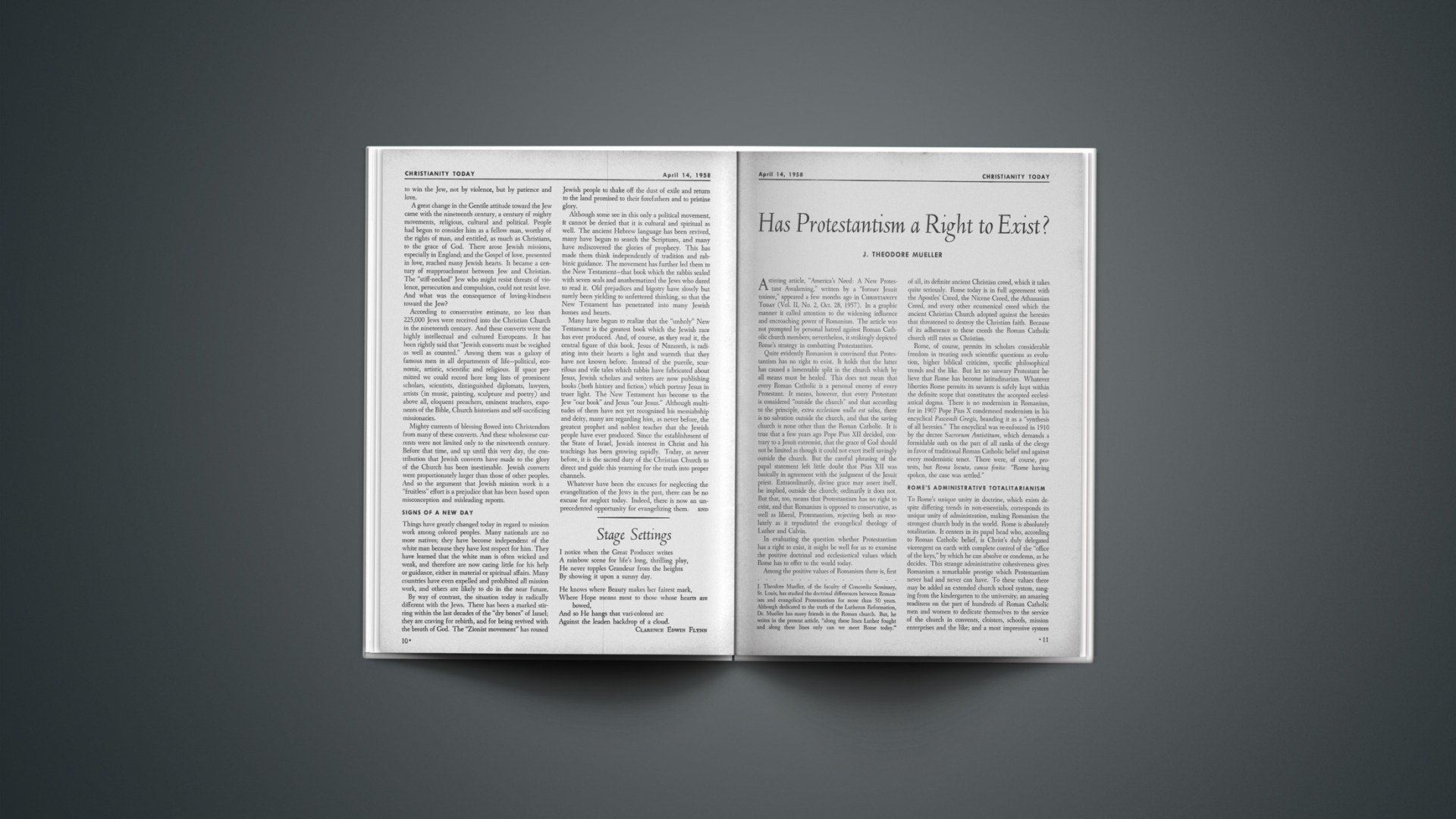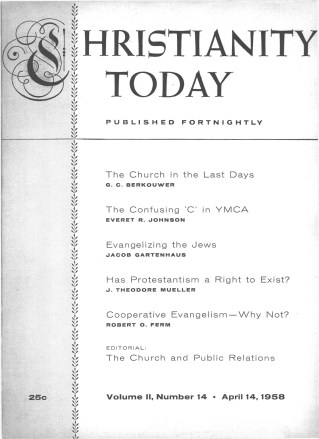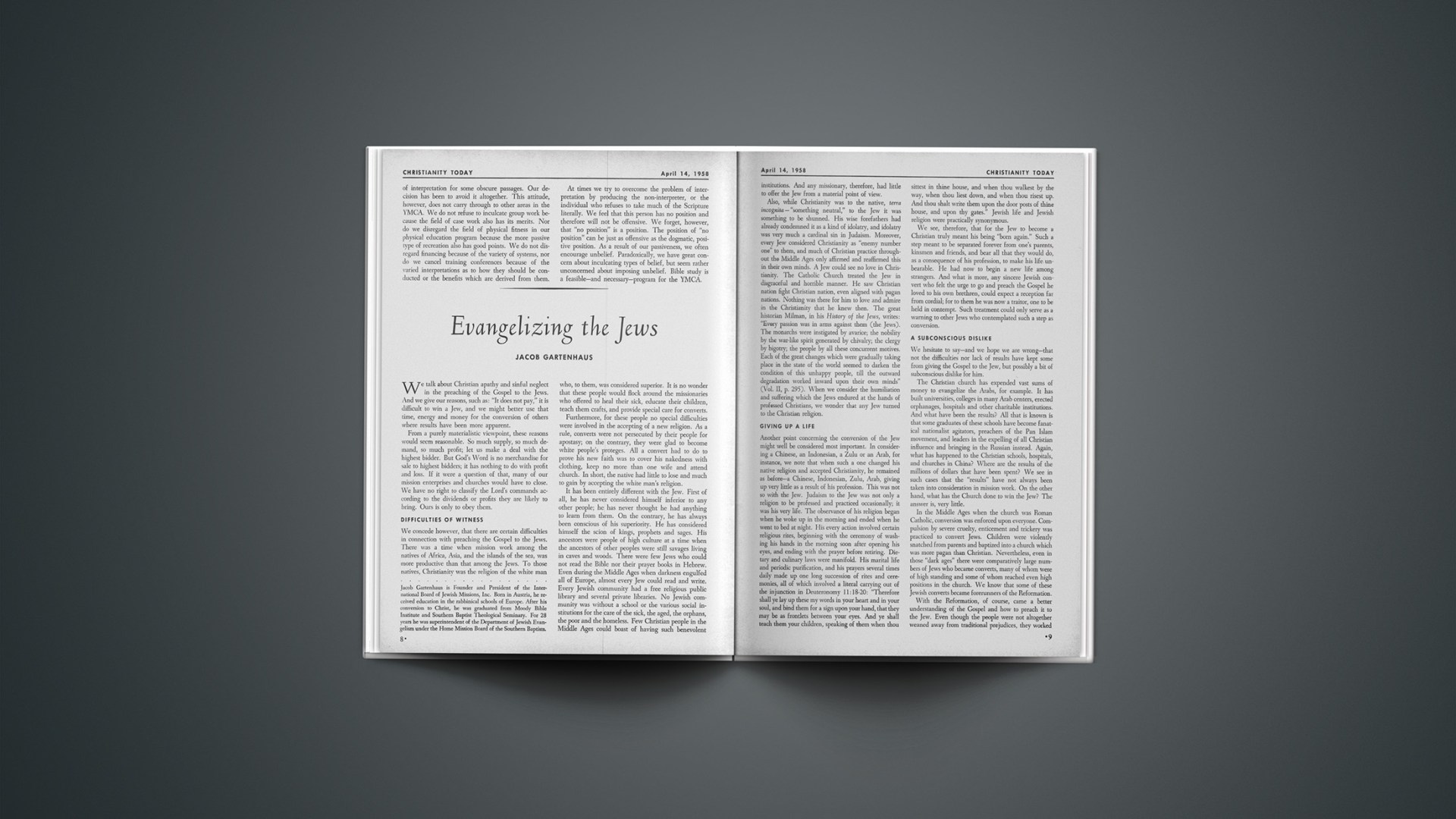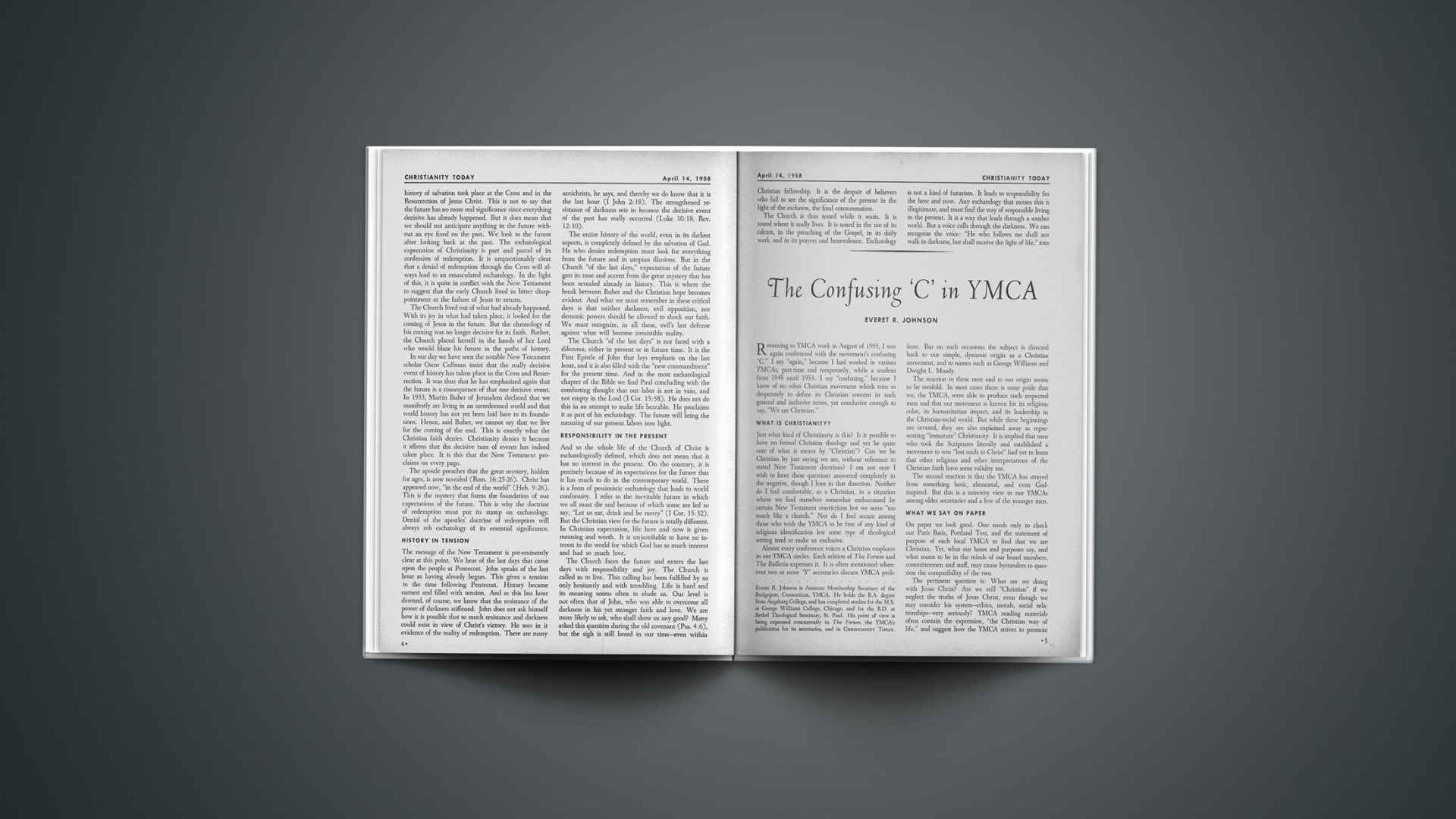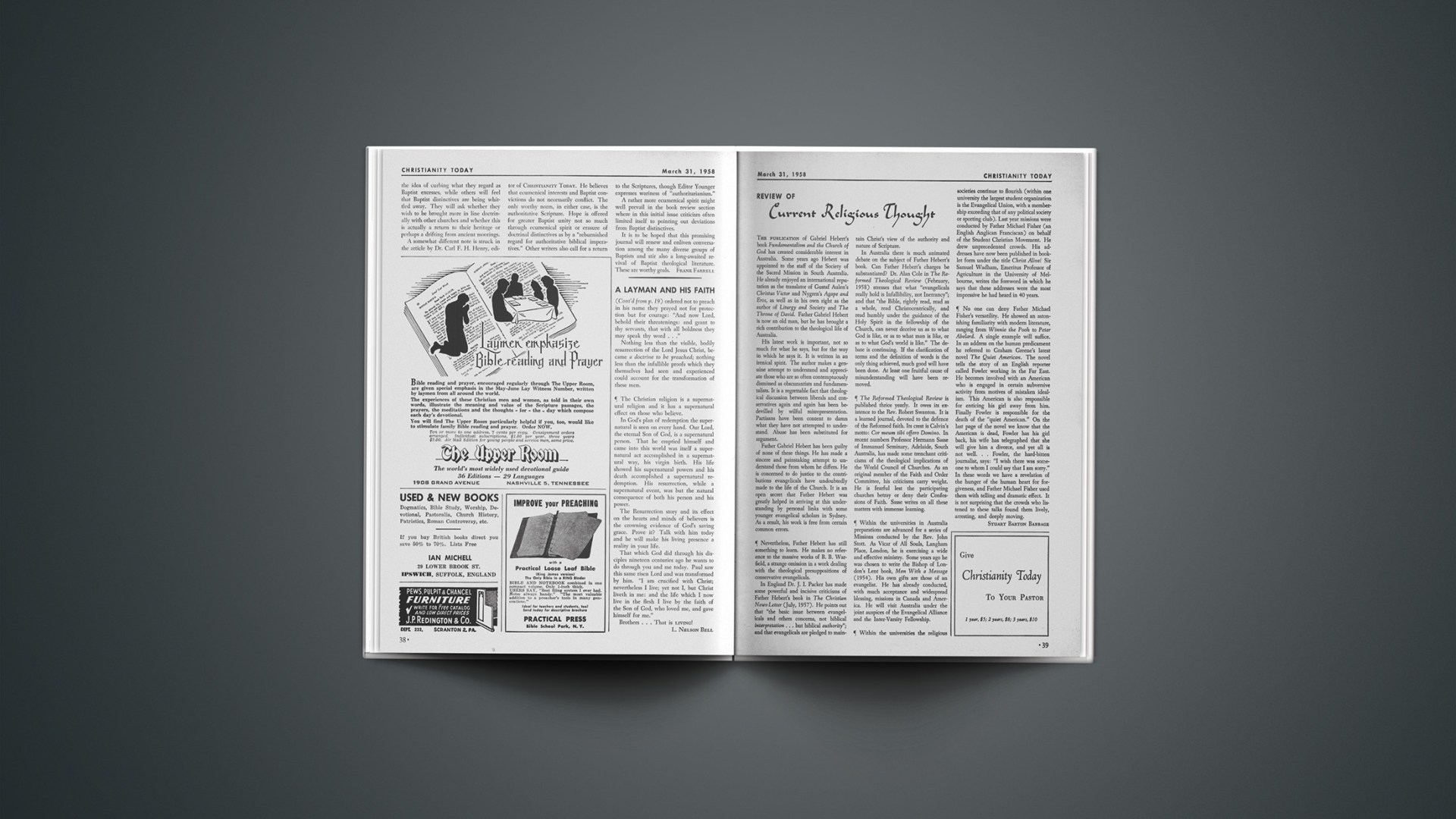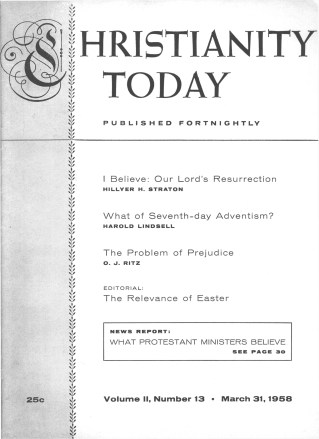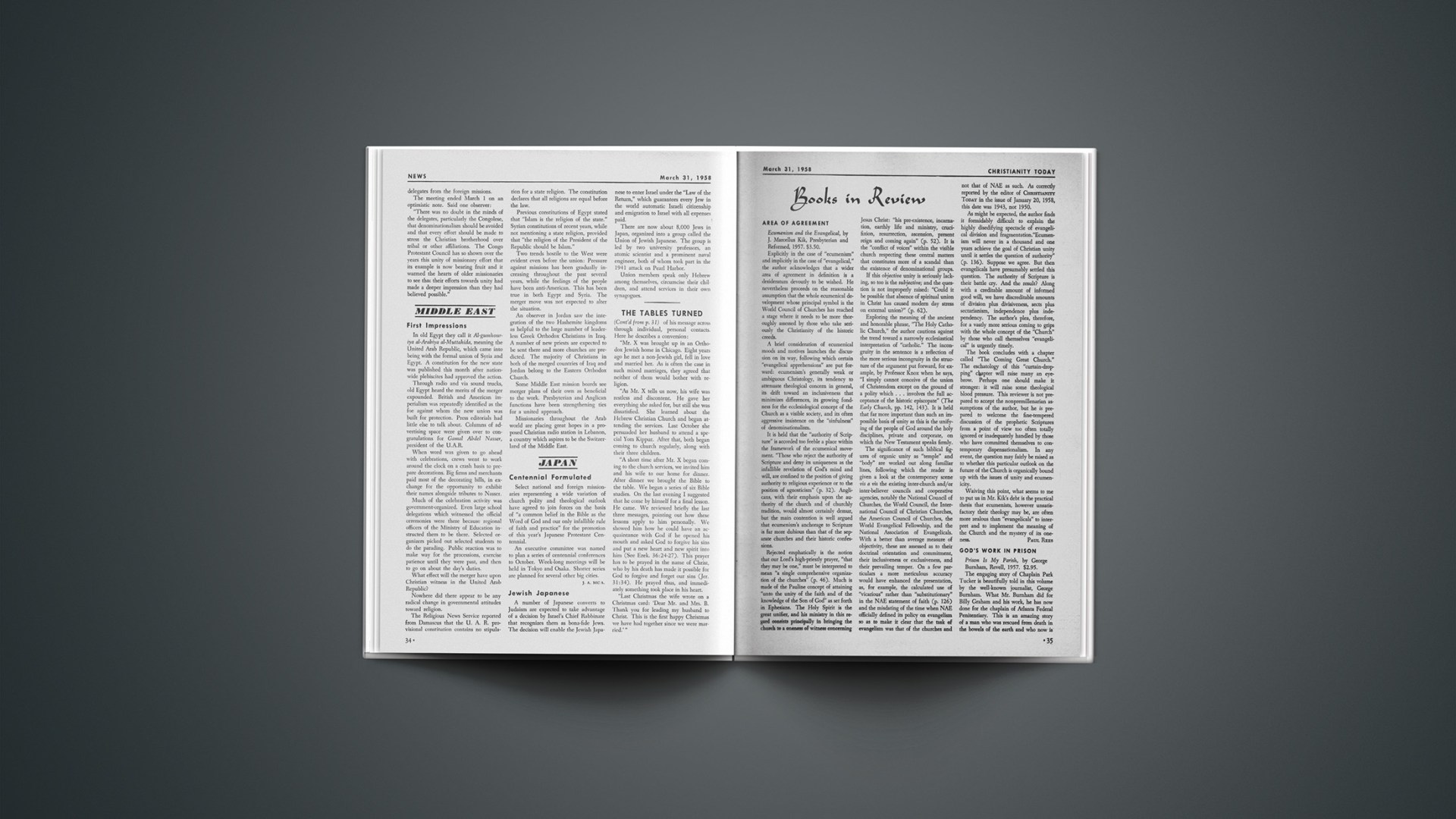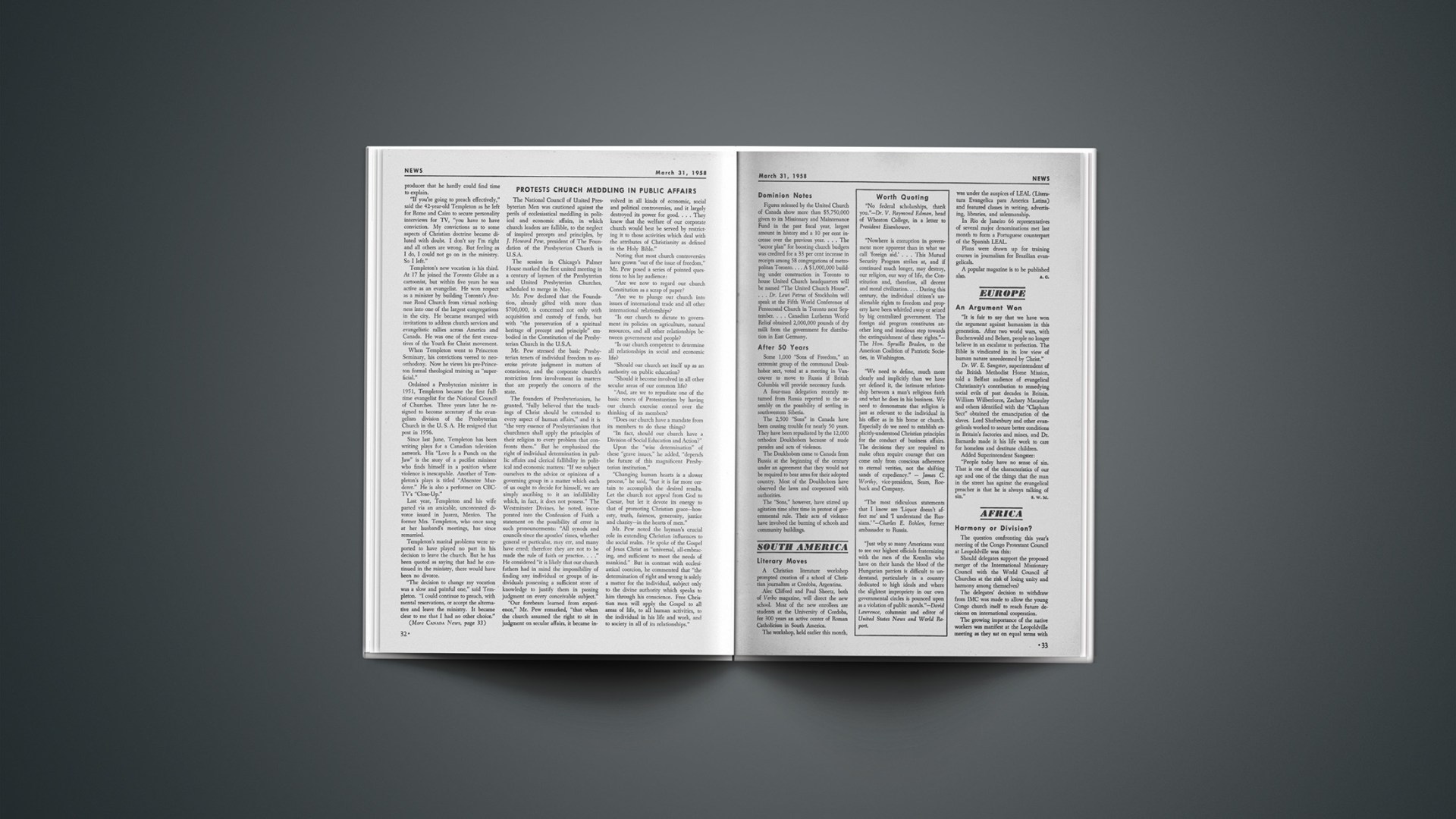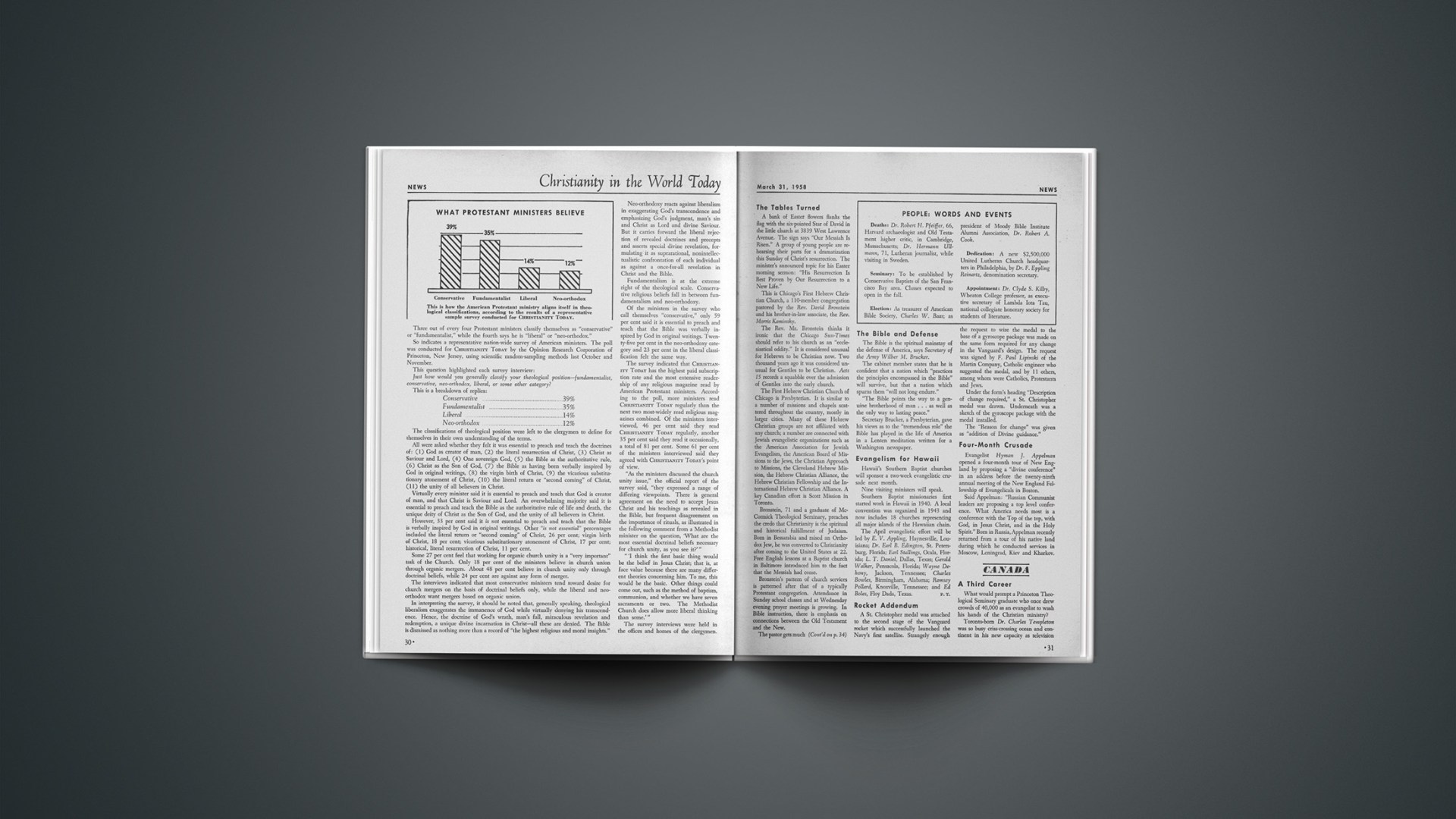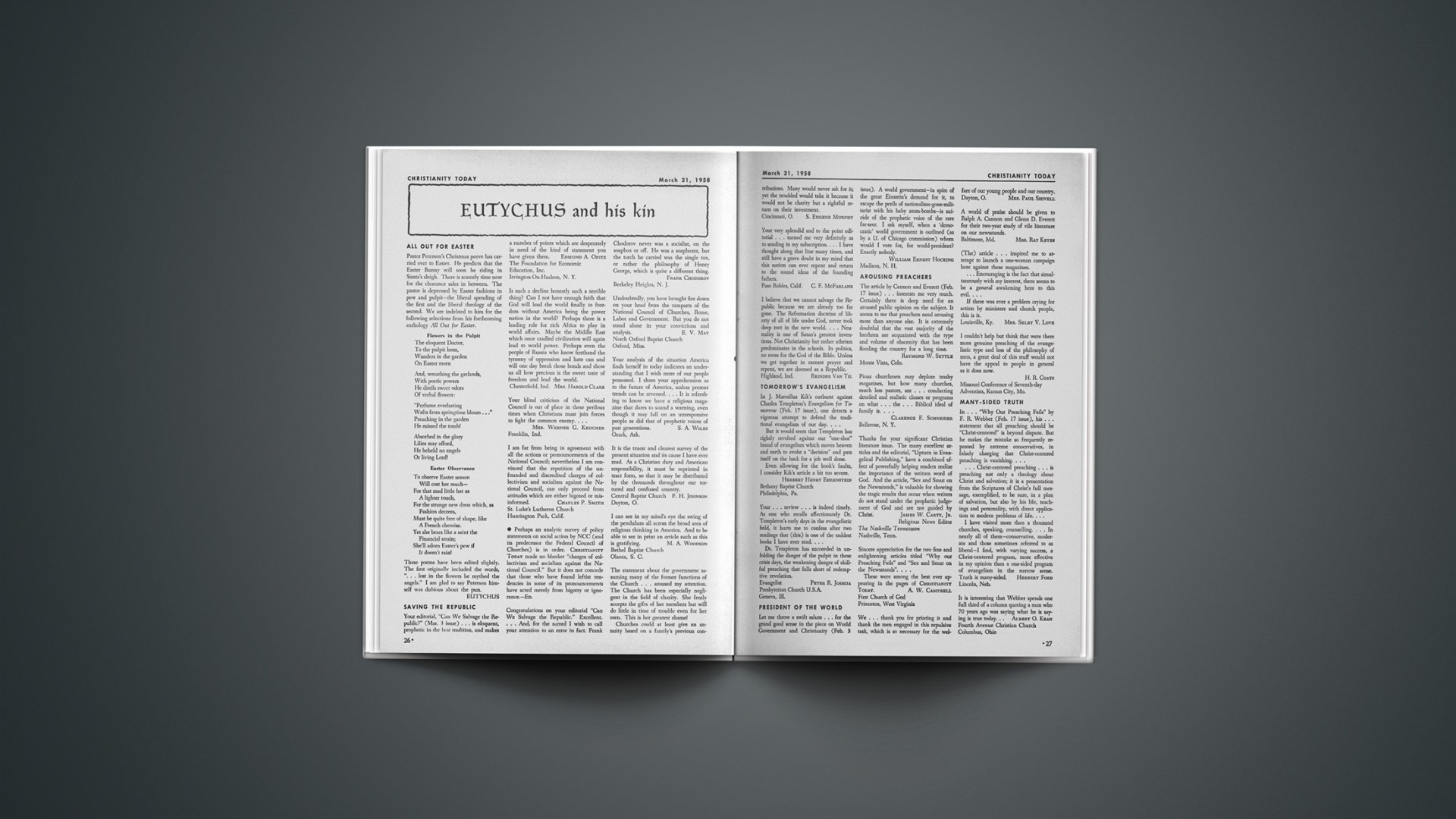A stirring article, “America’s Need: A New Protestant Awakening,” written by a “former Jesuit trainee,” appeared a few months ago in CHRISTIANITY TODAY (Vol. II, No. 2, Oct. 28, 1957). In a graphic manner it called attention to the widening influence and encroaching power of Romanism. The article was not prompted by personal hatred against Roman Catholic church members; nevertheless, it strikingly depicted Rome’s strategy in combatting Protestantism.
Quite evidently Romanism is convinced that Protestantism has no right to exist. It holds that the latter has caused a lamentable split in the church which by all means must be healed. This does not mean that every Roman Catholic is a personal enemy of every Protestant. It means, however, that every Protestant is considered “outside the church” and that according to the principle, extra ecclesiam nulla est salus, there is no salvation outside the church, and that the saving church is none other than the Roman Catholic. It is true that a few years ago Pope Pius XII decided, contrary to a Jesuit extremist, that the grace of God should not be limited as though it could not exert itself savingly outside the church. But the careful phrasing of the papal statement left little doubt that Pius XII was basically in agreement with the judgment of the Jesuit priest. Extraordinarily, divine grace may assert itself, he implied, outside the church; ordinarily it does not. But that, too, means that Protestantism has no right to exist, and that Romanism is opposed to conservative, as well as liberal, Protestantism, rejecting both as resolutely as it repudiated the evangelical theology of Luther and Calvin.
In evaluating the question whether Protestantism has a right to exist, it might be well for us to examine the positive doctrinal and ecclesiastical values which Rome has to offer to the world today.
Among the positive values of Romanism there is, first of all, its definite ancient Christian creed, which it takes quite seriously. Rome today is in full agreement with the Apostles’ Creed, the Nicene Creed, the Athanasian Creed, and every other ecumenical creed which the ancient Christian Church adopted against the heresies that threatened to destroy the Christian faith. Because of its adherence to these creeds the Roman Catholic church still rates as Christian.
Rome, of course, permits its scholars considerable freedom in treating such scientific questions as evolution, higher biblical criticism, specific philosophical trends and the like. But let no unwary Protestant believe that Rome has become latitudinarian. Whatever liberties Rome permits its savants is safely kept within the definite scope that constitutes the accepted ecclesiastical dogma. There is no modernism in Romanism, for in 1907 Pope Pius X condemned modernism in his encyclical Pascendi Gregis, branding it as a “synthesis of all heresies.” The encyclical was re-enforced in 1910 by the decree Sacrorum Antistitum, which demands a formidable oath on the part of all ranks of the clergy in favor of traditional Roman Catholic belief and against every modernistic tenet. There were, of course, protests, but Roma locuta, causa finita: “Rome having spoken, the case was settled.”
Rome’S Administrative Totalitarianism
To Rome’s unique unity in doctrine, which exists despite differing trends in non-essentials, corresponds its unique unity of administration, making Romanism the strongest church body in the world. Rome is absolutely totalitarian. It centers in its papal head who, according to Roman Catholic belief, is Christ’s duly delegated viceregent on earth with complete control of the “office of the keys,” by which he can absolve or condemn, as he decides. This strange administrative cohesiveness gives Romanism a remarkable prestige which Protestantism never had and never can have. To these values there may be added an extended church school system, ranging from the kindergarten to the university; an amazing readiness on the part of hundreds of Roman Catholic men and women to dedicate themselves to the service of the church in convents, cloisters, schools, mission enterprises and the like; and a most impressive system of social and benevolent service in the way of hospitals and institutions of mercy. Wholly united, then, in doctrine and practice, Rome’s impact upon the general public is tremendous, especially in countries—and this by a strange paradox—in which Protestantism prevails.
To all that has been said, however, must be added the footnote that Rome in Protestant countries is not what Rome is in Roman Catholic countries like Spain, Italy, Mexico, Central and South America, Ireland and others. A traveler, of course, must be fair and not lay all social, economic and political evils solely to Rome’s prevalence in these lands. Manifestly, many of these evils are rooted—in part at least—in the peculiar circumstances existing in these countries. Nevertheless, a tourist coming from Protestant England or Sweden to Roman Central or South America cannot help but ask why Rome with its full control of the situation has not improved the wretched conditions in these lands. We spare our readers details, since these are fully known. As someone has said, Rome needs Protestantism to keep it on the straight and narrow path.
Where Romanism Fails As A Church
Despite its positive values, Rome fails tragically in its central function and purpose as a Christian church. It does not proclaim to its followers the fundamental message of the Gospel: that of a free and full salvation by divine grace through faith in Christ. Rome indeed stresses the redemption of Christ, but as Luther put it 400 years ago, it destroys the bridge that leads the penitent sinner to Christ’s salvation. Rome in its decisions and canons of the Council of Trent has placed its irrevocable anathema upon all who teach salvation by grace through faith in Christ without works. It was at this point that Luther centered all his attacks upon Romanism, for Rome denied the sola gratia per fidem of the Scriptures and the ancient Christian Church. Rome, of course, also denied the sola scriptura, namely, the fundamental doctrine of believing Protestants that the canonical Scriptures are the only source and rule of faith and life.
Charles V had hoped that the Council of Trent might bring about a reconciliation between the Romanists and Protestants. But the Council fixed an impassable gulf between the two communions, and pronounced a blanket anathema upon all evangelical teachings of the Reformation. In addition, it circumscribed those evangelical elements, already in the church, in such a way that they were buried under an accumulation of erroneous teachings all of which centered in the unscriptural doctrines of work-righteousness, purgatory, the veneration of saints, compulsory confession to the priest and the like. Thus Romanism is largely pagan in its specific teachings, and urges upon its adherents a way to salvation which is not that of Christ and his holy apostles. Here again Romanism needs Protestantism to point out to it the pure Gospel way of salvation: by grace through faith in Christ without works.
The very fact, therefore, of Romanism’s unrecognized need, leads us to the inevitable corollary that only evangelical Protestantism has a right to exist, since it alone teaches the Gospel of salvation in full truth and purity.
Rome Needs Evangelical Protestantism
In view of its constant and wholehearted emphasis upon the sola fide (by faith alone), evangelical Protestantism has not only the right but a duty to exist. The erroneous tenets of Rome are all based on what it calls “tradition.” These are not the ancient Christian traditions which support the evangelical doctrines of the Scriptures. They are rather the “unwritten traditions” which, as Luther says in the Smalcald Articles, the Pope has “in the shrine of his heart” (in scrinio pectoris). Out of that shrine he draws them as he needs them to bolster Rome’s system of work-righteousness, the dogmas of papal infallibility, Mary’s immaculate conception, her assumption or ascension into heaven, her mediatorship, purgatory, the sacrificial value of the mass, the delivering of souls out of purgatory by means of intercessions, masses and the like. All these dogmas are man-made accretions to the evangelical teachings of the Christian creeds, and are at total variance with Scripture. Yet Rome teaches them as necessary to salvation and in so doing proves itself, at least in the area of these heresies, to be anti-Christian.
This may appear as severe judgment to some, but any loyal Protestant, holding to the principle of sola scriptura, cannot judge otherwise, according to the ancient principle: Quod non est biblicum, non est theologogicum: “What is not in agreement with Scripture must not be taught.” It is, therefore, the plain duty of believing Protestantism to affirm the evangelical truths taught in Scripture against anti-Christian Rome as well as against anti-Christian Protestantism.
While Romanism, side by side with its heresies, still retains such essential Christian teachings as the Trinity, the deity of Christ, his vicarious atonement, the resurrection of the dead and life everlasting for all who believe in Christ, modernistic Protestantism, both in its older extreme and its present modified form, has cast the whole treasure of Christian doctrine overboard, even when it uses the traditional theological language. As Dr. James DeForest Murch in his book, Cooperation Without Compromise (Eerdmans, 1956) points out, even the professed liberal C. C. Morrison, in The Christian Century (June 7, 14, 21, 1950) scathingly indicted the old Modernism for its utter failure “to discover the true nature of reality.” Neo-modernism also repudiates major facets of Christian doctrine. It does not believe in an authoritative Bible, does not accept the full New Testament stature of Christ, often reflects hazy ideas concerning his work, and may even reject the virgin birth of Jesus as untrue or at least irrelevant.
Today evangelical Christianity, true to the Bible, stands between anti-Christian Romanism and anti-Christian Modernism as a gospel voice crying out Christ’s free and full salvation to all who have ears to hear in the arid wilderness of religious apostasy. To both it speaks in love the divine truth of Christ’s saving Gospel. To both it witnesses the central Christian message: “Neither is there salvation in any other; for there is none other name under heaven given among men, whereby we must be saved” (Acts 4:12). Anti-Christian Protestantism rejects this divinely revealed salvation truth in toto; anti-Christian Romanism buries it under a bushel of heresies which hide from the eyes of men the redeeming, saving Christ, whose invitation of free and full salvation reads: “Come unto me all ye that labor and are heavy laden and I will give you rest.” It is this divine message of salvation that gives evangelical Protestantism both the right and the power to exist in our erring, perishing world. And both the right and the power are from the divine Lord, whose final command to his Church will stand till the end of time: “Preach the gospel to every creature” (Mark 16:15). That is its sacred task.
J. Theodore Mueller, of the faculty of Concordia Seminary, St. Louis, has studied the doctrinal differences between Romanism and evangelical Protestantism for more than 50 years. Although dedicated to the truth of the Lutheran Reformation, Dr. Mueller has many friends in the Roman church. But, he writes in the present article, “along these lines Luther fought and along these lines only can we meet Rome today.”

